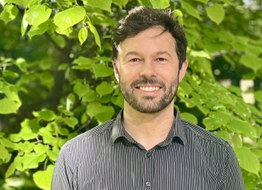Head of the group
Prof. Dr. Philipp Kanske
 © Anja Pixa
© Anja Pixa
Prof. Dr. Philipp Kanske
Send encrypted email via the SecureMail portal (for TUD external users only).
Visiting address:
Chair for Clinical Psychology and Behavioral Neuroscience, Room 315 Chemnitzer Str. 46
01187 Dresden
Office hours:
Appointments after previous agreement. Please send an e mail.
Philipp Kanske is Professor for Clinical Psychology and Behavioral Neuroscience at Technische Universität Dresden. He explores the emotional and cognitive processes that enable social behavior and their alterations in psychopathology. In his work he uses magnetic resonance imaging (MRI) and electroencephalography (EEG) to describe the underlying neuronal mechanisms.
I support the Open Science Initiative of the Faculty of Psychology.
Academic experience
|
since 2017 |
Professor for Clinical Psychology and Behavioral Neuroscience, Technische Universität Dresden |
|
2012 – 2017 |
Group Leader „Psychopathology of the Social Brain” at the Department of Social Neuroscience, Max Planck Institute for Human Cognitive and Brain Sciences, Leipzig |
|
2011 – 2012 |
Research staff at Heidelberg University, Department of Psychiatry, Section of Experimental Psychopathology and Neuroimaging, Heidelberg |
|
2009 – 2011 |
PostDoc at the Central Institute of Mental Health, Institute of Cognitive and Clinical Neuroscience, Mannheim |
Education
|
2014 |
Habilitation at Heidelberg University |
|
2011 |
Licensed Psychotherapist |
|
2008 |
Dr. rer. nat. at the University of Leipzig |
|
2005 |
Dipl.-Psych. at Technische Universität Dresden |
|
2004 |
M.Sc. at the University of Oregon, USA |
Honors and awards
| 2023 | ERC consolidator grant "INTERACT - The interplay of neural networks enabling social interaction" |
|
2017 |
Heinz Maier-Leibnitz Award of the German Research Foundation |
|
2015 - 2020 |
Member of the Young Academy at the German National Academy of Sciences Leopoldina and the Berlin-Brandenburg Academy of Sciences and Humanities (2019 - 2020 Speaker, 2018 - 2020 Member of the Board) |
|
2013 |
Lilly Young Investigator Fellowship in Bipolar Disorder at the International Conference on Bipolar Disorder |
|
2013 |
Young Investigator Award of the European Brain and Behaviour Society |
|
2013 |
„Rising Star” of the Association for Psychological Science |
|
2012 |
Young Investigator Award of the German Society for Psychophysiology and its Application |
|
2008 |
Otto Hahn Medal of the Max Planck Society |
|
2006 |
Werner Straub Award of the Department of Psychology at Technische Universität Dresden |
Publications
2012
-
Auditory affective norms for German: testing the influence of depression and anxiety on valence and arousal ratings, Jan 2012, In: PloS one. 7, 1, 6 p., e30086Electronic (full-text) versionResearch output: Contribution to journal > Research article
2011
-
Attentional orienting towards emotion: P2 and N400 ERP effects, Sep 2011, In: Neuropsychologia. 49, 11, p. 3121-3129, 9 p.Electronic (full-text) versionResearch output: Contribution to journal > Research article
-
Conflict processing is modulated by positive emotion: ERP data from a flanker task, 1 Jun 2011, In: Behavioural brain research. 219, 2, p. 382-386, 5 p.Electronic (full-text) versionResearch output: Contribution to journal > Research article
-
Cross-modal validation of the Leipzig Affective Norms for German (LANG), Jun 2011, In: Behavior research methods. 43, 2, p. 409-413, 5 p.Electronic (full-text) versionResearch output: Contribution to journal > Research article
-
How to regulate emotion?: Neural networks for reappraisal and distraction, Jun 2011, In: Cerebral cortex (New York, N.Y. : 1991). 21, 6, p. 1379-1388, 10 p.Electronic (full-text) versionResearch output: Contribution to journal > Research article
-
Emotion speeds up conflict resolution: a new role for the ventral anterior cingulate cortex?, Apr 2011, In: Cerebral cortex (New York, N.Y. : 1991). 21, 4, p. 911-919, 9 p.Electronic (full-text) versionResearch output: Contribution to journal > Research article
-
Positive emotion speeds up conflict processing: ERP responses in an auditory Simon task, Apr 2011, In: Biological psychology. 87, 1, p. 122-127, 6 p.Electronic (full-text) versionResearch output: Contribution to journal > Research article
-
Emotion triggers executive attention: anterior cingulate cortex and amygdala responses to emotional words in a conflict task, Feb 2011, In: Human brain mapping. 32, 2, p. 198-208, 11 p.Electronic (full-text) versionResearch output: Contribution to journal > Research article
2010
-
Decoding modality-independent emotion perception in medial prefrontal and superior temporal cortex, 8 Dec 2010, In: Journal of Neuroscience. 30, 49, p. 16417-16418, 2 p.Electronic (full-text) versionResearch output: Contribution to journal > Comment/Debate
-
Leipzig Affective Norms for German: A reliability study, Nov 2010, In: Behavior research methods. 42, 4, p. 987-991, 5 p.Electronic (full-text) versionResearch output: Contribution to journal > Research article
